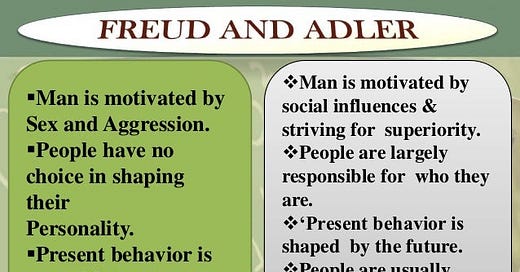A Discussion of the Characteristics of Adlerian Theory
Adlerian theory is a holistic approach to psychology that emphasizes the importance of overcoming feelings of inferiority and gaining a sense of belonging in order to achieve success and happiness.
Theory’s view of humanity
Adlerian therapy considers humanity as individuals with the freedom and responsibility to choose their goals and purpose in life. Adler also believed that humans adopted a fundamental approach to life by the age of six years old. Adler stressed a teleological approach or a goal-oriented nature in humans that stressed the conscious more than the unconscious while seeking fulfillment and the meaning of life (Tan, 2011). Adler also believed humans are motivated by social relatedness rather than sexual urges (Corey, 2013). This differentiated Adler from Freudian psychology and caused a break between them, which led him to form his psychological theories.
The Adlerian theory was closely related to biblical language. Adler believed that choice and the possibility of change should be emphasized in an individual. Adler also believed individuals should “identify and correct mistaken goals and basic mistakes in thinking.” The humanity of the Adlerian theory also stresses that individuals should have a sort of community feeling and be concerned with social interest (Tan, 2011). These concepts deal with the humanitarian side of the Adlerian theory and show that his theory supported individuals and their quest for their life’s work. This is one reason that Adlerian theory is classified as Individual Psychology because it deals with an individual concerning their holistic nature of “physical, psychological, social, and even spiritual aspects of human life” (Tan, 2011). Adler believed that individuals could find peace and nurturing in being concerned about others in social interest and having that community feeling close to individuals and stress the social interest. They both go hand-in-hand and complement each other. The holistic nature of every human can be looked upon by Adlerian theory as his basis for humanity.
Corey (2013) states that we must “master three universal life tasks,” which include “building friendships (social task), establishing intimacy (love-marriage task), and contributing to society (occupational task).” These tasks will help the individual holistically from the perspective of humanity. All of these attributes contribute to society as a whole and the individual. These tasks help complete community and humanity; we must all work, love, and talk. We must all work to continue to build humanity and the communities that we live in every day. We must have workers to complete the tasks we need as a community, and we must have a love-marriage relationship to continue to procreate humanity and communities. Lastly, we must build those relationships with friends each day. We must have people to converse with and love daily. Humanity is made of these relationships, and I believe that Adler had it correct when he stated these tasks must be completed and mastered for humanity.
Theory’s view of change
Adlerian therapy and their view of change attempt to help people see their lives differently than they view it presently. Adlerian theory fits into Third-Force Psychology. This concept consists of three principles that guide Adlerian theory. These principles are “purposiveness, holism, and social interest” (Evans and Meredith, 1991). If you break any of the principles, then the theory is irrelevant. They must all work in harmony to help change the clients. “Purposiveness means our attitudes, beliefs, and behaviors align with those subjective goals we perceive will give us social significance.” “Holism means individuals are a unity of thoughts, emotions, and behaviors moving in one direction,” and “social interest is an expression of belonging” (Evans & Meredith, 1991).
These principles work congruently to process change in an individual’s life. The process and belief in change concerning Adlerian theory can be bundled together in these three processes: (1) individuals can change when they find their purpose in life, (2) individuals can change when they see themselves in a holistic nature, and (3) individuals can change when they express social interest and a love for others rather than selfishness.
Lastly, Adlerian therapy also helps encourage clients during their trial. Adlerian therapy attempts to help clients with their behaviors and attitudes. They try to bring them from a “problem/failure focus to a focus on solutions/ successes” (Watts & Pietrzak, 2000). In essence, Adlerian theory wants to help individuals with the way they process information and their trials. I always heard in my lifetime that bad things happen to everyone, and the difference in outcomes is how you handle the storm. A person can come out bitter or better. I believe this is the concept that Adlerian therapy attempts to accomplish. We can either focus on the bad, or we can focus on the good, and we can have a significant or lousy result. It is totally up to us and the way that we process trials. I found that Adlerian theory helps people with change in several ways.
BIBLIOGRAPHY
Corey, G. (2013). Theory and Practice of Counseling and Psychotherapy. Independence, KY: Cengage Learning.
Evans, T.D. & Cameron, W.M. (1991). How Far Can You Go and Still Be Adlerian? Individual Psychology, 47 (4), 541-547.
Tan, S. (2011). Counseling and Psychotherapy. Grand Rapids, MI: Baker Academic.
Watts, R.E. & Pietrzak, D. (2000). Adlerian “Encouragement” and the Therapeutic Process of Solution-Focused Brief Therapy. Journal of Counseling & Development, 78, 442-447.




